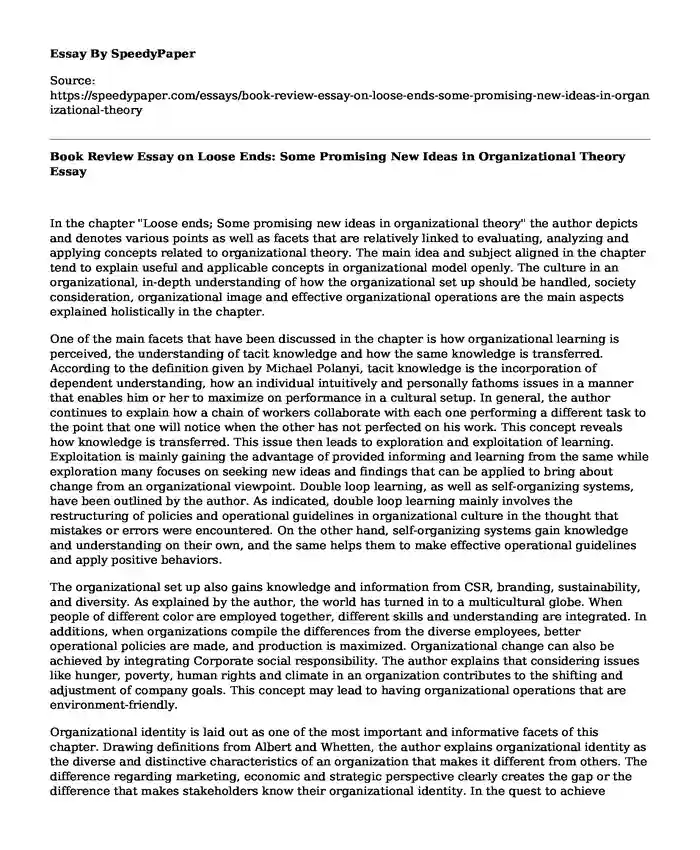
| Essay type: | Book review |
| Categories: | Management |
| Pages: | 3 |
| Wordcount: | 789 words |
In the chapter "Loose ends; Some promising new ideas in organizational theory" the author depicts and denotes various points as well as facets that are relatively linked to evaluating, analyzing and applying concepts related to organizational theory. The main idea and subject aligned in the chapter tend to explain useful and applicable concepts in organizational model openly. The culture in an organizational, in-depth understanding of how the organizational set up should be handled, society consideration, organizational image and effective organizational operations are the main aspects explained holistically in the chapter.
One of the main facets that have been discussed in the chapter is how organizational learning is perceived, the understanding of tacit knowledge and how the same knowledge is transferred. According to the definition given by Michael Polanyi, tacit knowledge is the incorporation of dependent understanding, how an individual intuitively and personally fathoms issues in a manner that enables him or her to maximize on performance in a cultural setup. In general, the author continues to explain how a chain of workers collaborate with each one performing a different task to the point that one will notice when the other has not perfected on his work. This concept reveals how knowledge is transferred. This issue then leads to exploration and exploitation of learning. Exploitation is mainly gaining the advantage of provided informing and learning from the same while exploration many focuses on seeking new ideas and findings that can be applied to bring about change from an organizational viewpoint. Double loop learning, as well as self-organizing systems, have been outlined by the author. As indicated, double loop learning mainly involves the restructuring of policies and operational guidelines in organizational culture in the thought that mistakes or errors were encountered. On the other hand, self-organizing systems gain knowledge and understanding on their own, and the same helps them to make effective operational guidelines and apply positive behaviors.
The organizational set up also gains knowledge and information from CSR, branding, sustainability, and diversity. As explained by the author, the world has turned in to a multicultural globe. When people of different color are employed together, different skills and understanding are integrated. In additions, when organizations compile the differences from the diverse employees, better operational policies are made, and production is maximized. Organizational change can also be achieved by integrating Corporate social responsibility. The author explains that considering issues like hunger, poverty, human rights and climate in an organization contributes to the shifting and adjustment of company goals. This concept may lead to having organizational operations that are environment-friendly.
Organizational identity is laid out as one of the most important and informative facets of this chapter. Drawing definitions from Albert and Whetten, the author explains organizational identity as the diverse and distinctive characteristics of an organization that makes it different from others. The difference regarding marketing, economic and strategic perspective clearly creates the gap or the difference that makes stakeholders know their organizational identity. In the quest to achieve organizational identity difference, the author depicts that most organizations tend to engage stakeholders in the aim to understand how the organization is perceived from the outside and apply strategies to makes sure that the outside and inner identity are in line. Some other methods like normative approaches that suggest reputable management helps to create a good organizational identity are also applied.
The author also focuses on distributed phenomena about organizational culture, brans, and identity. As denoted, the author gives examples of definitions given by theorists like Rodseth, and Ann Swidler who try to explain that distributed phenomena is carrying of different cultural traits from one place to another and employing the same where one goes. The differences that are acquired by diverse people help to close or zip the gaps that others see as limitations. As written by the author, the distributed phenomenon is important because it helps an organization to embrace diversity and apply the cultural components carried by specific individuals. In relation to that, the author further co-joins the aesthetics of organizations as well as those of organizing. The broad explanation is that aesthetics in an organization as well seen by how they do their production, form of branding and design and also the level of expertise acquired by the employees. Lastly, the author explains how hermeneutics, drawing from the explanation given by Gadamer; the author states that hermeneutics helps to shape an organization by reading and interpreting the historical trend and applying the same to achieve objectives set for the present and the future. It can also be used to predict the future by focusing on previous interpretations and learning various concepts from the same.
Reference
Hatch, M. J. (2018). Organization theory: Modern, symbolic, and postmodern perspectives. Oxford university press.
Cite this page
Book Review Essay on Loose Ends: Some Promising New Ideas in Organizational Theory. (2022, Jun 20). Retrieved from https://speedypaper.com/essays/book-review-essay-on-loose-ends-some-promising-new-ideas-in-organizational-theory
Request Removal
If you are the original author of this essay and no longer wish to have it published on the SpeedyPaper website, please click below to request its removal:
- Strategic Petroleum Reserve, Essay Sample for Free Download
- Why Is Obesity a Problem in Society - Get an Answer from This Free Essay
- Art Essay Example
- Essay Example on Bill Cunningham
- Essay Sample: Advocating for the Healthcare Needs of the Veterans by Nurses
- Essay Sample: Analyzing and Discussing the Payer Mix for APN Release
- Free Essay: Status and Suggestions of Multimedia Information Technology Application Teaching
Popular categories




